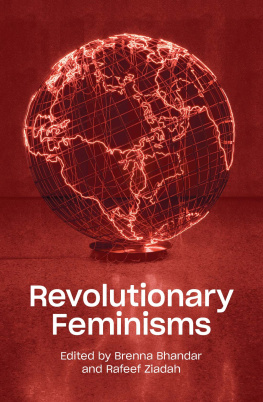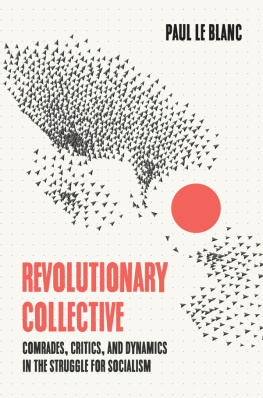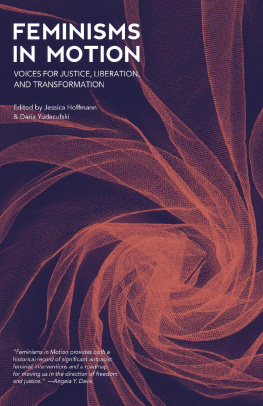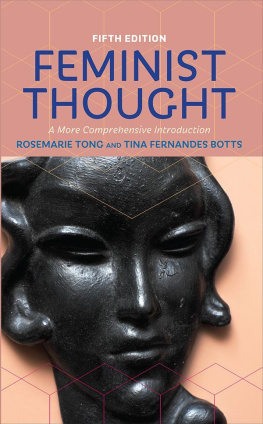Brenna Bhandar - Revolutionary Feminisms: Conversations on Collective Action and Radical Thought
Here you can read online Brenna Bhandar - Revolutionary Feminisms: Conversations on Collective Action and Radical Thought full text of the book (entire story) in english for free. Download pdf and epub, get meaning, cover and reviews about this ebook. publisher: Verso Books, genre: Politics. Description of the work, (preface) as well as reviews are available. Best literature library LitArk.com created for fans of good reading and offers a wide selection of genres:
Romance novel
Science fiction
Adventure
Detective
Science
History
Home and family
Prose
Art
Politics
Computer
Non-fiction
Religion
Business
Children
Humor
Choose a favorite category and find really read worthwhile books. Enjoy immersion in the world of imagination, feel the emotions of the characters or learn something new for yourself, make an fascinating discovery.
- Book:Revolutionary Feminisms: Conversations on Collective Action and Radical Thought
- Author:
- Publisher:Verso Books
- Genre:
- Rating:3 / 5
- Favourites:Add to favourites
- Your mark:
- 60
- 1
- 2
- 3
- 4
- 5
Revolutionary Feminisms: Conversations on Collective Action and Radical Thought: summary, description and annotation
We offer to read an annotation, description, summary or preface (depends on what the author of the book "Revolutionary Feminisms: Conversations on Collective Action and Radical Thought" wrote himself). If you haven't found the necessary information about the book — write in the comments, we will try to find it.
Brenna Bhandar: author's other books
Who wrote Revolutionary Feminisms: Conversations on Collective Action and Radical Thought? Find out the surname, the name of the author of the book and a list of all author's works by series.
Revolutionary Feminisms: Conversations on Collective Action and Radical Thought — read online for free the complete book (whole text) full work
Below is the text of the book, divided by pages. System saving the place of the last page read, allows you to conveniently read the book "Revolutionary Feminisms: Conversations on Collective Action and Radical Thought" online for free, without having to search again every time where you left off. Put a bookmark, and you can go to the page where you finished reading at any time.
Font size:
Interval:
Bookmark:

Revolutionary Feminisms
Revolutionary Feminisms
Conversations on Collective Action and Radical Thought
Edited by Brenna Bhandar and Rafeef Ziadah

First published by Verso 2020
Collection Verso 2020
Contributions The contributors 2020
All rights reserved
The moral rights of the editors and authors have been asserted
1 3 5 7 9 10 8 6 4 2
Verso
UK: 6 Meard Street, London W1F 0EG
US: 20 Jay Street, Suite 1010, Brooklyn, NY 11201
versobooks.com
Verso is the imprint of New Left Books
ISBN-13: 978-1-78873-776-0
ISBN-13: 978-1-78873-778-4 (US EBK)
ISBN-13: 978-1-78873-777-7 (UK EBK)
British Library Cataloguing in Publication Data
A catalogue record for this book is available from the British Library
Library of Congress Cataloging-in-Publication Data
A catalog record for this book is available from the Library of Congress
Typeset in Minion by Biblichor Ltd, Edinburgh
Printed and bound by CPI Group (UK) Ltd, Croydon CR0 4YY
This book is dedicated to the memories of our grandmothers, Ranjit Kaur Sran and Malakeh Hajjar.
And to the young ones, Kira, Zadie, Kalen, Ami, Mai, Joseph and Esha.
Contents
We write a few days into an apparent lockdown in the city of London, as the government attempts to mitigate the effects of the global pandemic. One third of the worlds population is now effectively quarantined to some degree. As the effects of ten years of cuts to the National Health Service are now revealing the true cost of austerity for society in its entirety, it is imperative to insist on a vision of healthcare as a universal social good, not as a marketised commodity that has to be re-nationalised in order to effectively cope with intense stress. We have seen increased racist attacks on Asian people in the weeks preceding the lockdown, the hoarding of basic necessities by individuals, sweeping emergency powers being brought swiftly into force; we are at the same time, also witnessing the ability of the government, with the stroke of a pen seemingly, to provide unprecedented amounts of financial support for workers who will be unable to earn a living during these months, and to re-nationalise various elements of the national transport network. Our employers will for the first time it seems, be forced to confront the inconvenient fact of socially reproductive labour as they grapple with how those of us who are able to, will continue to work from home. Mutual aid networks are springing up everywhere, as people try to support one another in their local communities, particularly the most vulnerable. Extraordinary times, deeply unsettling, and perhaps a moment when we can continue to think, alone and together, about how to radically transform what we value and how we value those things; how we want to organise healthcare, work, the care of children and the elderly, food security. We hope that as the crisis subsides, whenever that is, that we find the collective will and desire not to continue as usual in the aftermath of this pandemic.
This project, which has stretched over more than a few years, has reached fruition due to the generosity of many people. First and foremost are the interviewees, who generously and patiently agreed to collaborate with us. Their work has long been an inspiration to both of us and so many others. We are deeply grateful to Lisa Lowe for writing the afterword, opening up new horizons to consider as we complete this project. We would also like to thank our editor at Verso, Rosie Warren, for her support and encouragement. Sam Smith did a wonderful and meticulous copy edit for which we are thankful. We are grateful to Rashmi Varma for her thoughtful and constructive feedback on the introduction. We would like to acknowledge the support of SOAS, University of London for allocating transcription funds. Brenna would like to thank all of her feminist friends, and particularly on this occasion Haneen Naamnih, whoregularly prompts her to question things taken for granted. She gives heartfelt thanks to Alberto Toscano, for discussing each and every aspect of this project over a lengthy period of time with great care, enthusiasm and insight. Rafeef thanks her family for their love and support, Laleh Khalili who continues to be a brilliant friend and mentor, and Adam Hanieh for his unfailing support and encouragement for this project.
I use the term radical in its original meaning getting down to and understanding the root cause. It means facing a system that does not lend itself to your needs and devising means by which you change that system.
Ella Baker, 1969
The feminisms that we explore in this book are rooted in various political contexts and situated within a variety of political traditions. In fact, they are too diverse to easily name under a single heading. Black feminism, Indigenous feminism, socialist feminism, communism, Third World feminism, queer feminism: all of these terms and others could be used to describe the political work and thought of the people we have interviewed. At the same time, despite the range of differences that mark each of the revolutionary scholars interviewed here, their scholarly works also share a number of qualities that create a common ground for their political thought and activism. Namely, each of them has devised anti-capitalist, anti-imperialist and anti-racist feminist frameworks of analysis. All of the individuals interviewed here, along with ourselves, may not agree on every detail but we share the belief that freedom requires revolutionary transformation in the organisation of the economy, social relations, political structures, and psychic and symbolic worlds, and that this must take place across multiple scales from intimate relations between individuals to those among individuals, communities and the state.
In this introduction, our aim is to map some of the feminist lineages that appear in the book, as a means of drawing out the common ground shared by the interviewees and identifying what we consider to be absolutely crucial for feminist politics in our current conjuncture. When we write our current conjuncture, we mean an explicit location: a postimperial metropolis, in which the mainstream political scene has jolted (again) to the right, with a highly developed neoliberal economy and mode of governance unfolding hand in hand with an ever-emboldened racist nationalism. Although the global financial crisis of 2008 shook the very foundations of the economic system, capital quickly recalibrated to offload the crisis onto ordinary people through long-term austerity politics, intensifying its assault on public services and living standards. This is consistent with the longer-standing neoliberal capitalist project, in the making for several decades, that has entailed the restructuring of capital on a global scale, the rise of new centres of accumulation, the weakening of trade unions, and the flexibilisation of labour. As we explore below, this has disproportionately affected people of colour and women workers.
The conversations included in this book are part of feminist genealogies rooted in Black feminist engagements with communist politics in the United States and the UK; feminist engagements with Marxism and communism in Italy, India and beyond; Indigenous feminisms grappling with the specifically gendered aspects of racial, settler colonial capitalism; and diasporic and queer feminisms confronting the racial caste hierarchies of labour markets and borders in postcolonial and settler colonial states. Fundamentally, these feminisms are formed by and formative of diverse histories of radical thought and action. Going against the contemporary obsession with novelty and newness in academic and related media environments, our aim in this introduction is more or less the opposite: it is to explore the collective memory and histories of struggle that shape the very possibilities of radical change in our present and near future.
Font size:
Interval:
Bookmark:
Similar books «Revolutionary Feminisms: Conversations on Collective Action and Radical Thought»
Look at similar books to Revolutionary Feminisms: Conversations on Collective Action and Radical Thought. We have selected literature similar in name and meaning in the hope of providing readers with more options to find new, interesting, not yet read works.
Discussion, reviews of the book Revolutionary Feminisms: Conversations on Collective Action and Radical Thought and just readers' own opinions. Leave your comments, write what you think about the work, its meaning or the main characters. Specify what exactly you liked and what you didn't like, and why you think so.











